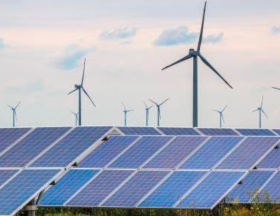The International Renewable Energy Agency IRENA says green hydrogen could disrupt global trade and bilateral energy relations by leading to a repositioning of states, with the emergence of new exporters and users of hydrogen.
The rapid growth of the global hydrogen economy could bring significant geoeconomic and geopolitical changes by generating a wave of unprecedented interdependencies, according to new analysis from the International Renewable Energy Agency (IRENA). According to the report “Geopolitics of the Energy Transformation: The Hydrogen Factor”, hydrogen is changing the geography of energy trade and regionalizing energy relations, as evidenced by the emergence of new centers of geopolitical influence built around the production and use of hydrogen, while the traditional trade in oil and gas is in decline.
Driven by the climate emergency and countries’ commitments to net zero emissions, IRENA estimates that hydrogen will cover up to 12% of global energy consumption by 2050. Growth targeted trade and investment in a market dominated by fossil fuels and currently valued at USD 174 billion is likely to boost economic competitiveness and change the foreign policy landscape with the conclusion of bilateral agreements far removed from the type of relationship that characterized the hydrocarbon market in the 20th century.
“Hydrogen could prove to be the missing link to a climate-friendly energy future,” said Francesco La Camera, Director General of IRENA. “Hydrogen is clearly benefiting from the renewable energy revolution, with green hydrogen emerging as the wild card for achieving climate neutrality without compromising industrial growth and social development. But hydrogen is not the new oil. And the transition is not about changing fuels but about changing systems, resulting in political, technical, environmental and economic disruptions. »
“It is green hydrogen that will bring all sorts of new market participants, diversify supply routes and sources, and lead to a devolution of power to a multitude of players. With international cooperation, the hydrogen market could be more democratic and more inclusive, and offer new opportunities for both developed and developing countries. »
IRENA estimates that more than 30% of hydrogen could be dedicated to cross-border trade by 2050, a higher percentage than for natural gas today. Countries that are not traditional players in energy trading are establishing bilateral relations around hydrogen. As more and more players and new classes of net importers and exporters emerge on the world stage, the militarization and cartelization of the hydrogen trade is unlikely, unlike what we observe with the geopolitical influence of oil and gas.
Cross-border hydrogen trade is set to grow considerably. Indeed, more than 30 countries and regions are already forecasting strong commercial activity today. Some countries that project themselves as future importers, such as Japan and Germany, are already betting on diplomacy in the field of hydrogen. Fossil fuel exporters increasingly see clean hydrogen as an attractive way to diversify their economy. This is the case, for example, of Australia, Oman, Saudi Arabia or the United Arab Emirates. Nevertheless, broader economic transition strategies are needed because hydrogen will not compensate for oil and gas revenue losses.
The technical potential for hydrogen production greatly exceeds the estimated global demand. The countries most capable of producing cheap renewable electricity will be in the best position to produce competitive green hydrogen. While some countries such as Chile, Morocco or Namibia are now net energy importers, they are on the way to becoming exporters of green hydrogen. Harnessing the potential of regions such as Africa, the Americas, the Middle East and Oceania could limit the risk of export concentration, but many countries will need technology transfers, infrastructure and investments to large scale.
The geopolitics of clean hydrogen will likely unfold in different stages. According to the report, the 2020s will see a great race for technological leadership. But demand is not expected to take off until the mid-2030s. By then, green hydrogen will compete with the costs of fossil hydrogen globally, a phenomenon predicted even earlier in countries like China. , Brazil and India. Green hydrogen was already affordable in Europe when natural gas prices spiked in 2021. Gas pipeline refurbishments are expected to further boost demand and facilitate hydrogen trade.
Countries with vast renewable energy potential could become sites of green industrialization and use their potential to attract energy-intensive industries. Moreover, being part of the hydrogen value chain can boost economic competitiveness. The manufacture of equipment like electrolyzers and fuel cells, in particular, could boost activity. China, Japan and Europe have already gained a head start in production, but innovation will further transform the current manufacturing landscape.
Green hydrogen can enhance energy independence, security and resilience by reducing import dependency and price volatility and increasing the flexibility of the energy system. However, the raw materials needed for hydrogen and renewable technologies raise the question of material security. Shortages and price fluctuations could ripple through hydrogen supply chains and negatively impact costs and revenues.
Shaping the rules, standards and governance of hydrogen could lead to geopolitical competition or usher in a new era of enhanced international cooperation. In particular, supporting developing countries to deploy green hydrogen technologies and scale up hydrogen industries would help avoid further widening global decarbonization gaps and promote fairness and transparency. inclusion by creating local value chains, green industries and jobs in countries rich in renewable energy.
Source IRENA











Réagissez à cet article